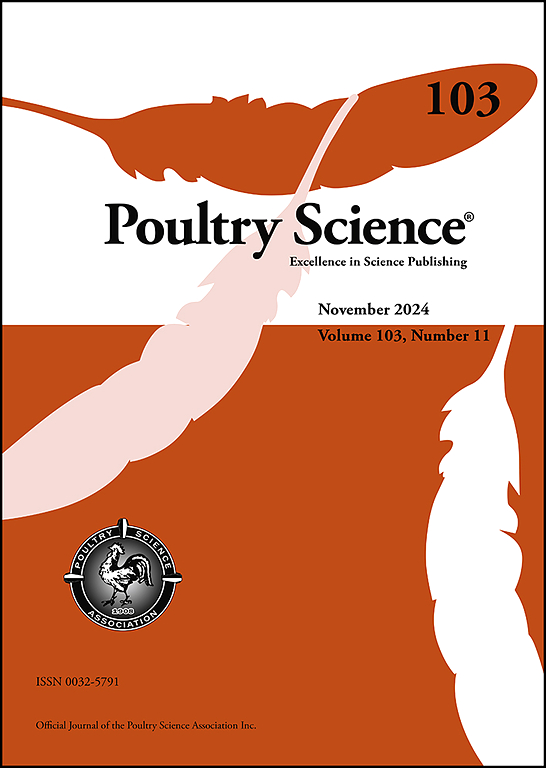Impact of dietary polyphenols from shredded, steam-exploded pine on growth performance, organ indices, meat quality, and cecal microbiota of broiler chickens
IF 3.8
1区 农林科学
Q1 AGRICULTURE, DAIRY & ANIMAL SCIENCE
引用次数: 0
Abstract
The chicken's gastrointestinal tract is home to complex and diverse microbial communities that can be manipulated to enhance health and productivity. Although polyphenols have recently attracted the attention of researchers due to their potent antioxidant capabilities, their impact on the gut microbiota remains largely unexplored. Hence, in this study, we conducted a comprehensive analysis of the effects of dietary supplementation with polyphenol-rich extract from shredded, steam-exploded pine particles (PSPP) on growth, meat quality, and gut microbial dynamics in broiler chickens. Supplementation of PSPP was found to significantly improve birds’ FCR until the third week of the trial but only marginally affected meat quality. Based on metataxonomic analyses of the cecal microbiotas of broilers fed increasing concentrations of PSPP, dietary PSPP modulated the composition of the cecal microbiota of the birds with a concomitant increase of Bacteroidetes and a decrease in the Firmicutes population. Similar trends were observed for the proportions of Alistipes and Faecalibacterium at the genus level. Additionally, 43 unique bacterial species were detected in the cecal microbiome of birds fed with PSPP. However, microbial diversity did not vary significantly among treatment groups. A particularly interesting finding was the specialization observed in the microbiome of birds receiving PSPP supplementation. Microbial co-occurrence network analyses revealed substantial modifications in their network structure when compared to control birds. Families like Rikenellaceae and Eubacteriaceae were notably absent, and the number of microbial interactions was drastically lower in the PSPP-fed group. Microbial taxa modeling revealed that the impact of increasing dietary PSPP levels primarily affected genus-level taxa, showing a decreasing trend. Overall, this offers compelling evidence that continuous PSPP supplementation may not only alter the composition of intestinal microbes but also have a profound effect on the interactions among different microbial species. Conversely, PSPP had minimal effects on broilers’ performance and meat quality.
求助全文
约1分钟内获得全文
求助全文
来源期刊

Poultry Science
农林科学-奶制品与动物科学
CiteScore
7.60
自引率
15.90%
发文量
0
审稿时长
94 days
期刊介绍:
First self-published in 1921, Poultry Science is an internationally renowned monthly journal, known as the authoritative source for a broad range of poultry information and high-caliber research. The journal plays a pivotal role in the dissemination of preeminent poultry-related knowledge across all disciplines. As of January 2020, Poultry Science will become an Open Access journal with no subscription charges, meaning authors who publish here can make their research immediately, permanently, and freely accessible worldwide while retaining copyright to their work. Papers submitted for publication after October 1, 2019 will be published as Open Access papers.
An international journal, Poultry Science publishes original papers, research notes, symposium papers, and reviews of basic science as applied to poultry. This authoritative source of poultry information is consistently ranked by ISI Impact Factor as one of the top 10 agriculture, dairy and animal science journals to deliver high-caliber research. Currently it is the highest-ranked (by Impact Factor and Eigenfactor) journal dedicated to publishing poultry research. Subject areas include breeding, genetics, education, production, management, environment, health, behavior, welfare, immunology, molecular biology, metabolism, nutrition, physiology, reproduction, processing, and products.
 求助内容:
求助内容: 应助结果提醒方式:
应助结果提醒方式:


